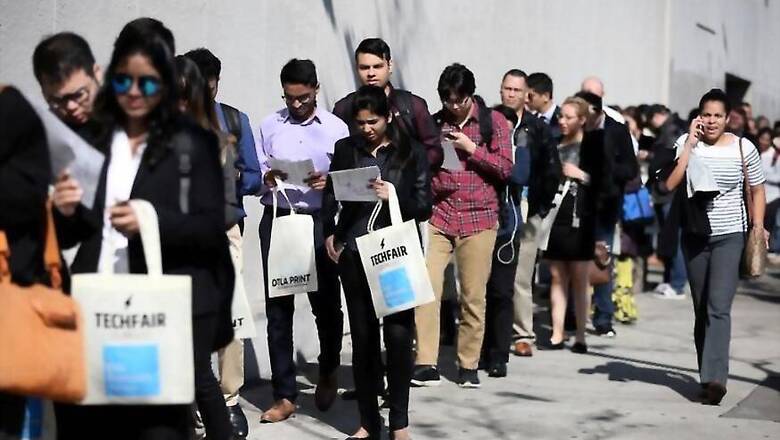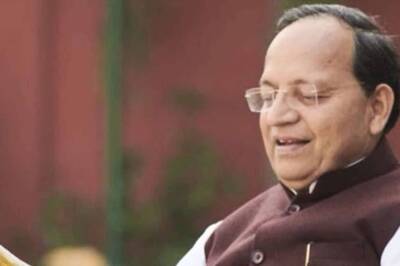
views
This May, Harsh Rochlani, pursuing Master's in Information and Technology from Worcester Polytechnic Institute in the United States, was supposed to have his “well-deserved” graduation ceremony with all the pomp and grandeur. Instead, he is “worrying about paying the rent and having money for groceries”.
The Covid-19 pandemic and lockdown has deprived many graduating students of American colleges and universities of the rendering of Pomp and Circumstance, a tune composed by late English composer Edward Edgar, which is customarily played on graduation day the US.
It is distressing for students like Rochlani to miss out on the grand ceremony. They are now anxious about the job prospects in the US and the impending global recession.
For many foreign students, leaving the United States immediately without work experience would be disastrous considering the investment they made into their future. Those in India planning to get scholarships to study in the US have to reconcile to the fact that a global recession is expected to scar the economy, which will likely affect the number of grants, loans availability and assistantships abroad, say experts. They should remember that in times of downturn it is the social sector that is most affected.
No job offers, and a loan to repay
Rochlani, who spoke to News18.com from the US, said, “I would be graduating this May. One thing I will not get is my well-deserved ceremony of graduation. And due to the lockdown, I have lost my on-campus job; it was my main source of income.” He was working in the gym for 12 dollars, putting in 10-15 hours a week, which helped him sustain himself in America.
“It is hard to pay for rent and groceries,” he said, uncertain about his stay in the US. "The companies that were interested in hiring me have paused hiring or cancelled the role I was suited for. It seems to me applying for jobs is a waste of time as of now."
Now Rochlani is searching for certificate courses and preparing himself for when an interviewer knocks on his doors.
After completing his Bachelor of Engineering (BE) studies in electronics and telecommunication from Vivekanand college in Mumbai, he chose Worcester Polytechnic Institute because it “has a 100% recruitment rate and it met all course requirements”. Rochlani's family is worried for him but insists that he stay for work while he is apprehensive about the possibility of having to leave America without the full realisation of his dream.
“My family is confused. They want me to work for another year in the US before making further decisions. But I don’t know the job scenario yet, and if I return immediately to India then it would not be worth the investment I have made,” he said. To pursue his master’s degree, he invested $70,000 (about Rs 65 lakh), and he has around Rs 25 lakh of loans to pay. “Critical decisions have to be made,” Rochlani said, adding that many of his friends are calling him up with advice.
He doesn’t know what lies ahead. “If I touch my face I might be in quarantine. Everything is uncertain and requires carefulness.”
Coronavirus and financial crisis
Bloomberg Economics created a model in 2019 to determine America’s recession odds. The report said that the chance of a recession stands at 100%. While the analysis confirmed an end to the nation’s longest-running expansion, the National Bureau of Economic Research in the US has not yet declared that the country is in recession. Experts though foresee a global financial crisis due to the Covid-19 pandemic and lockdown, and that is going to be a big challenge.
This is likely to impact the decision of Indian parents in investing in their children’s future for higher education. The students are unsure about finding a US employer and getting an opportunity to study in America, while parents are facing job uncertainties or dwindling businesses in times of halted economic activity.
“Financing a foreign degree will be hard. As you know, bachelor's and master's students use their own funds, but doctorate students are more likely to be funded by the university. So we may see student flows at the bachelor's and master's level fall. But like I said, so far it seems like students have been accepting their offers of admission,” said Oxford University alumnus Gaurav Khanna, who is an assistant professor of economics at the School of Global Policy and Strategy at the University of California in San Diego.
“Furthermore, one of the main reasons students from India come to the US is with the prospect of finding a good job here after graduation. Every time there is a recession in the US or tightening of work visas (like in the past), this has affected students' decisions to come to the US. This may happen again now,” he said.
Khanna has learnt that universities are still grappling with these issues. “Given today's technology, a lot of university production can shift online (teaching, research collaboration, etc.), but not everything," he said. "I think universities are most worried about revenue shortfalls, and so may tighten their budgets in many ways, but still encourage more and more international student flows.”
Educationist Narendra Jadhav explained that there are two categories of Indian students who look for an American education, and the current crisis might affect them differently. “One category is of those with parents who won’t be affected or governed by monetary considerations of sending their children to the US for education. They are wealthy for such considerations.”
Typically, these are the people who send their children abroad for higher education from the undergraduate level itself. For these people, there will be no impact. “It only depends on their perception of the future and safety in the USA, and money is not a constraint for them,” Jadhav added.
Then there is a second category of students who cannot go on their own. They are capable and excellent but have no means of going, “I think this particular class is going to be hit,” said Jadhav.
"We have to factor in that in the one-year transitional phase there is going to be a massive global recession, which means the perception of going abroad has to change for the poor and meritorious category – as scholarship will not be available as earlier, and the loans do not cover the whole part. The downward swing in economy, registering negative growth has effect on the social sector. So it's not just scholarships that are likely to be lower, but the teaching and student assistantships that changed financial security for these students drastically in terms of availability are going to be lower as well,” he said.
The poor and meritorious cannot fully and completely finance their education because it’s so expensive in the US, but as a good student one manages to get some funds to make an entry at the postgraduate level, said Jadhav. "The bright ones get some teaching assistantship or student assistantship after one semester along with the tuition waiver, which reduces the cost dramatically,” he added.
Bank loans are not likely to be very readily available due to a huge problem in liquidity, he pointed out. “How high NPA in educations loans will be we can’t say. There will be a supply side problem if banks are not willing to give loans. On demand side it would depend on perception of these people about going abroad,” said Jadhav.
Things are likely to be increasingly difficult even for those who want to work in the US after the degree to make the most of the investment, he argued.
There is no doubt that students will be worried not just about the learning experience, but also all the features of the experience – including interacting with and making professional connections with high-quality classmates, working on research projects with professors, and having access to potential US-based employers.
“Yet, the outside option of not going to college at this time is not good either – the Indian economy is going to be hit badly, and good jobs will not be easy to find. From that point of view, the best option for many may be to get a valuable degree so that when this passes, they have the credentials to re-join the economy at its upswing,” Khanna added.
US encourages admissions
Experts pointed out that admission-offer-acceptance rates have not fallen yet. Students, and universities, are worried about how things will play out, especially if travel is restricted and visas are not being processed. “The aim seems to be that many universities will start instruction in a manner that will enable students to join from abroad,” said Khanna.
That means having recorded lectures, and frequent Zoom-based office hours. Universities have been spending a lot of time and effort to make this experience as rewarding as possible. Khanna added, “Students are an important source of revenue, and universities have already lost a lot of revenue over this last month. They can't afford to not make a strong effort.”
The United States-India Educational Foundation (USIEF) said in a statement to News18.com, “Despite the current unprecedented circumstances, we strongly encourage Indian students to accept new offers of admission from accredited US higher education institutions.”
The USIEF said that once a student commits to an American college or university, they can rely on that university to provide them with updated information and help them navigate through the current period of uncertainty.
“Education USA advisers are encouraging students who have been admitted to institutions for the upcoming academic year to maintain regular contact with university representatives to understand how the semester is being planned for them and what the next steps are,” the foundation said.
Prospective students are encouraged to continue working with Education USA centres through their virtual programming for opportunities to interact with US university representatives, current students and alumni who have successfully completed their degree programmes in the US and have valuable guidance to offer, the USIEF said.
“The Covid-19 pandemic has had unprecedented impact on society and the global economy," it added. "The entire world is grappling with this unique crisis and it is difficult to make predictions about the future at this stage.”




















Comments
0 comment